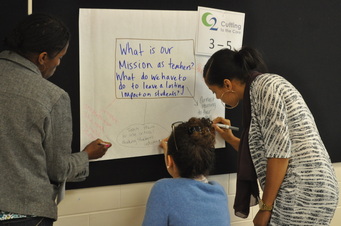 Educators talk Common Core at a Teach Plus event.
Educators talk Common Core at a Teach Plus event. Or that’s what opponents might like you to believe.
As a teacher, I understand the resistance to the seemingly never-ending push to adopt new standards, new curricula, and new initiatives before we feel like we’ve even had a shot at the last ones. I understand the worry that we’ll be evaluated on our student’s performance on a new set of dramatically more challenging standards without the time or resources to prepare our students in earnest. But when it comes to the Common Core, it’s time for us to step up. These are the standards we’ve been waiting for.
Years of study and deliberative consensus-building forged this historic agreement between the states that focuses on how best to prepare our students for the challenges of college and careers. Now it’s in our hands, as teachers, to get our students from where they are to where they need to be. As a teacher whose students are working at a range of levels, from beginning literacy to the verge of college-ready, I understand the difficulty of the challenge in front of us. The turnaround won’t happen overnight, and evaluations ought to keep that in mind, but raising the bar and opening new doors of opportunity for our students is exactly why we are in this business to begin with, isn’t it? It’s for that reason that I’m participating in “Cutting to the Core,” an 8-month free series to help D.C. area teachers understand and implement the new standards. Teachers meet in teams based on grade level and content once per month to talk about topics from communicating about Common Core to unwrapping and assessing the new standards. I will be one of the facilitators for the 9-12th grade English language arts and content teachers’ group and can’t wait to meet more passionate educators ready to teach in a fundamentally new way. (To participate in the December and January sessions, you must attend Nov. 13, and you can register here.)
There is no doubt that Common Core represents a fundamental shift in how we educate; the question for educators is: Will we be spectators or actors? Will we lose time stuck in a status quo that few of us are satisfied with, or will we shape this change and ensure our students are on a path to success in a fast-changing global economy? Despite the pockets of resistance and the spreading misconceptions, teachers all over the country are embracing the new standards and working to build and share new resources that will bring them to life for all of our students. For us, our schools and most importantly our students, teachers must choose to engage.
Scott Goldstein is a social studies and ESL teacher at a D.C. public charter school. He can be reached via email or Twitter.

 RSS Feed
RSS Feed